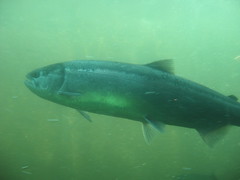 Image by .leila via Flickr
Image by .leila via Flickr
The Truth About Farmed Salmon, PCBs and Your Health by Allie Moxley
Many people are concerned about the potential adverse health effects of eating farmed salmon; studies have shown that farmed salmon may contain high amounts of toxic chemicals, which when ingested over a long period of time may be damaging to your health. Here we look at the facts.
Farmed salmon, unlike wild Alaska salmon are grown and raised within a contained space. They contain more fat than wild salmon, meaning their total omega-3 fatty acid content is similar to wild fish; the difference, however, is that the extra fat is contaminated with PCBs (polychlorinated biphenyls) and upwards of 100 other pollutants, including toxic pesticides. Those who ingest farmed salmon on a regular basis may be risking their health, exceeding government limits for these types of pollutants. Potential dangers include fetal brain damage, immune system damage, and cancer.
Farmed salmon comprises around 22% of all retail seafood sales; many consumers eat salmon because of its cardiovascular benefits. What they do not know is that farm raised salmon contains high amounts of PCBs. PCBs are known to cause cancer and they were in fact banned in the United States in 1976. Farmed salmon have been shown to accumulate dangerous amounts of PCBs due to the fishmeal they are fed.
Salmon farms moreover, are breeding grounds for parasitic sea lice, which infect young salmon and feed on their blood and scales. In fish farms a high concentration of fish are kept in a small, confined area, increasing the growth of sea lice to unnaturally high numbers. This puts wild salmon at risk as well, as these sea lice are likely to escape and infect wild fish. Moreover, treatment of sea lice with chemicals may be harmful to other sea creatures and it may not even reduce the levels of lice enough to protect wild Alaska salmon.
Wild Alaska salmon feed on ocean fish, which are lower in pollutants and fat. They are much healthier than their farmed counterparts, which should be eaten only once a month if at all. Wild caught fish are not only healthier for humans, they are also better for the environment. The next time you choose to eat salmon, opt for wild Alaska salmon.
Alaska is home to an abundant variety of seafood, and offers some of the purest marine, freshwater, and upland habitats on the planet.
From the clear crystal waters comes seafood that is delicious and healthy. Alaskan seafood is low in fat but big on flavor and Omega-3 oils. You can study thousands of pages of nutritional research. Or, simply observe the amazing health and longevity of people in countries where seafood is the most important part of their diet. Either way, Alaska seafood is as healthy as it is delicious.
Are you are looking for a meal that is low in saturated fat, filled with nutrients and packed with good heart healthy Omega-3s oils? Then you should start with Alaska Seafood.
Article Source: http://EzineArticles.com/?expert=Allie_Moxley
http://EzineArticles.com/?The-Truth-About-Farmed-Salmon,-PCBs-and-Your-Health&id=2037187![Reblog this post [with Zemanta]](http://img.zemanta.com/reblog_e.png?x-id=b0d25ed9-d227-4429-8ad0-29bebba804a4)
No comments:
Post a Comment